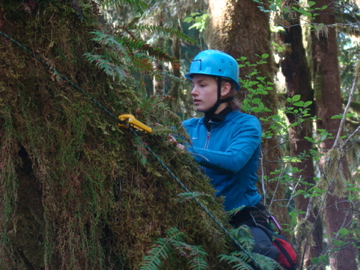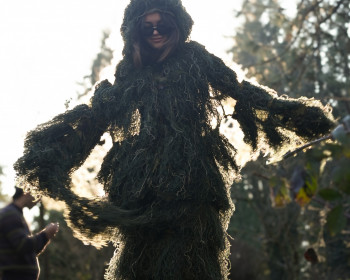NSF funds biology professor’s efforts to unlock forests’ microbial mysteries
Open gallery

As the Lewis & Clark campus swarms with activity this fall, a member of the biology faculty will be thousands of miles away, deep in the forests outside of Mexico City, examining a previously unstudied belowground ecosystem. Peter Kennedy, assistant professor of biology, hopes his study of alder trees will improve the ecological health of forests around the world.
Kennedy, who has published widely on the impact of fungus and bacteria on plant life, has uncovered symbiotic relationships between microbes and trees—insights that could yield improvements in urban and rural land management worldwide. His work has recently earned him a $317,000 grant from the National Science Foundation, a $42,000 grant from the Murdock Charitable Trust, and a Fulbright fellowship to study trees in Mexico and France.
“Better understanding how these communities are structured will help in managing forests,” Kennedy said. “Very little is known about how different groups of plant-associated microbes interact; the alder system is an ideal one to better understand the nature of these multi-way symbioses.”
Kennedy’s research could have potential applications for tree health around the world. Numerous studies have been done on alder tree communities in temperate climates, such as the United States and Europe, but the ecology of the alder tree community in Mexico, which represents a tropical ecosystem, has not been studied.
“Many timber trees are dependent on the symbioses I study and better understanding how these microbes help trees grow and handle stress could greatly assist forest land managers,” Kennedy said. “These symbionts also play an important role in ecosystem recovery from both natural and man-made disturbance, and more knowledge about their ecology will help in preserving and restoring urban and rural green spaces.”
The support Kennedy has received from prestigious foundations will further enhance his research of alders by providing the resources for him to study how bacteria associated with alder trees affect the diversity and function of the co-associated fungal communities. Kennedy hopes his research makes its way to forest managers to help them better understand the effects of different land management practices on biological diversity.
Collaboration in the classroom and around the world
Kennedy’s research projects in microbial ecology stretch across many regions of the world and most often involve collaboration with other researchers—seasoned and newcomers.
In partnership with two ecologists from his alma mater University of California-Berkeley, Kennedy recently investigated the role that root-associated fungi play in helping plants adapt to different soil types at Lambir Hills National Park located on the Malaysian island of Bornea.
The NSF- and Murdock-sponsored research will also involve collaboration with researchers in France. By studying alder forests in multiple locations around the world, Kennedy hopes the proposed research will be able to link patterns at a global scale and provide more robust conclusions than previous studies.
In 2009, Kennedy and a team of three undergraduate Lewis & Clark student researchers published a paper in Microbial Ecology that detailed research on tree canopies in the Olympic National Forest. Surprisingly, they found the microbial symbioses in the canopy were very similar to those on ground.
His research will also extend into the high school classroom. One component of the NSF grant involves collaboration with a high school biology teacher, which will result in a teaching module about plant-microbial symbioses and their importance in Pacific Northwest forests.
Kennedy said nurturing future scientists is an important and rewarding element of his work as a scientist.
“Nearly all of the work I do is based on student-faculty collaboration,” Kennedy said. “I have greatly enjoyed working with students at Lewis & Clark. They are really enthusiastic about doing research and consistently work at the same level as most graduate students at other institutions.”
Biology major Logan Higgins ’11 is in the midst of her second summer working with Kennedy in his lab. Her senior thesis involves research on the bacteria present in the same Mexican alder forests Kennedy’s Fulbright research is focused on. Higgins said her work with Kennedy has inspired her appreciation for biodiversity and helped shape her vision of life as a scientist.
“The research we do is all about revealing the diversity of microbial life buried right beneath our feet,” Higgins said. “When most people think of ecology, they think big: rainforests, elephant herds, coral reefs, that sort of thing. But working with Peter has shown me that biodiversity is every bit as relevant on much smaller scales than we’re used to, and it can be encountered absolutely anywhere you care to look.
“Working with him has given me a glimpse of what my own life and career might look like in another decade or so, if I work hard and continue to ask good questions.”
More Newsroom Stories
Public Relations is located in McAfee on the Undergraduate Campus.
MSC: 19
email public@lclark.edu
voice 503-768-7970
Public Relations
Lewis & Clark
615 S. Palatine Hill Road MSC 19
Portland OR 97219

